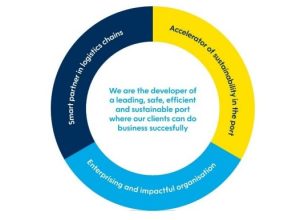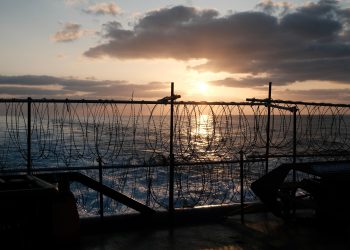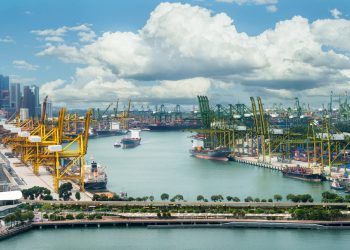The Port of Rotterdam published its annual report for 2021, outlining its work during the year, as well as its programmes.
The Port of Rotterdam Authority achieved earnings of €512.2 million (2020: €477.5 million) before interest, taxes, depreciation and amortisation. The energy transition is gaining ever more momentum in the port. The investment decision for various projects was taken last year, whereas for others it is planned for 2022. This and much more can be read in the annual report under the heading ‘Building the port of tomorrow together’.

Contribution to the Sustainable Development Goals
The Port of Rotterdam is aware of its responsibility for its impact on society and it assumes that responsibility. The recently updated Corporate Social Responsibility (CSR) statement shows the principles the port stands for at the Port of Rotterdam Authority and it is based on international CSR frameworks such as the United Nations Global Compact (UNGC) and the OECD (Organisation for Economic Cooperation and Development) guidelines.
Corporate code
Principles relating to human rights and working conditions, the environment and anti-corruption are fundamental to the Port’s corporate code. That code describes how the Port behaves with respect to its locality and commits it to the ‘Ten Principles’ of the United Nations Global Compact (UNGC).
#1 Human rights and working conditions
At the Port of Rotterdam Authority, the Port supports and respects human rights and good working conditions. The port wants to ensure that it has no part in violations of human rights.
#2 Prioritisation in risks relating to human rights
To identify the most serious risks relating to human rights associated with the business, a scan was conducted that included a media analysis, interviews with employees and findings from surveys. A distinction was made here between, on the one hand, the impact of the Port’s activities and, on the other, the impact of the activities of business associates in the Port’s chain such as suppliers, clients and partners.
#3 Policy for prioritised risks
For the company, the corporate code sets out general principles relating to respecting human rights and good working conditions. For the Port of Rotterdam Authority, these principles mean that people are free to exercise their right of association and that the Port wants to eliminate any form of discrimination. The corporate code also describes forms of desirable and undesirable conduct towards colleagues, job applicants, staff from outside the organisation, customers, suppliers and clients. In addition, explicit policies have been established in the areas of occupational health and safety, privacy and diversity.
#4 Legal remedies
If there is a suspicion of malpractice, improper conduct or unethical conduct, employees and third parties can report in various ways.
#5 Environment
It follows from the Port’s corporate code that it takes precautions to address environmental challenges, engage in initiatives to further environmental responsibility, and encourages the development and adoption of environmentally friendly technologies. The Port of Rotterdam is working to reduce the carbon footprint of its own organisation further.
#6 Anti-corruption
In its corporate code, the Port of Rotterdam endorses the importance of tackling corruption and fraud. Every employee is expected to prevent both. In addition, it rejects all forms of corruption, including bribery and extortion. In its onboarding programme, an e-learning module and courses on ethical conduct, it instils an awareness of the procedures and guidelines in place to prevent undesirable conduct.
#7 International work
Through its joint ventures, the Port of Rotterdam works in Oman and Brazil. It also provides consultancy services in Indonesia, India, Mozambique, Argentina, Egypt and Latvia. In its international activities, the Port is guided by the general CSR policy as it applies at the Port of Rotterdam Authority. In 2022, the port will explore the further application of guidelines for its international operations.

Diversity and inclusiveness
The Port of Rotterdam Authority wants to be a diverse organisation where everyone feels at home. Diversity in the workplace furthers the quality of teams, decision-making, and the agility and innovative capacity of the organisation. An inclusive organisation is resilient, agile, flexible and adaptive. In an inclusive organisation, there is a safe and open culture where everyone has the opportunity to voice their opinions and where there is equality. In addition, a varied workforce profile matches the changing labour market better.
The goal is to improve diversity and inclusiveness at the Port of Rotterdam Authority. The Port of Rotterdam’s initiatives in this respect target areas include: a better male-female ratio, better age diversity, the recruitment of employees from different cultural backgrounds and actively seeking to employ people who have difficulty finding work. The guideline for a vacancy is that the new employee will always be ‘the best person in the right place’ and contribute to the diversity of the organisation.
Safety and security
Safety and security in the Port and industrial complex constitute one of the top priorities of the Port of Rotterdam Authority. ‘Safety and security landscape’ are continuously monitored and knowledge and expertise about the various subjects are shared.
#1 Accidents
The Port of Rotterdam reports on the safety of shipping traffic using the Nautical Safety Index (NSI). This is an index which takes the seriousness of incidents into account. In 2021, the NSI was 7.46, which is higher than the standard of 7.0.
#2 Subversive crime
Drugs-related crime at the Port was in the news regularly last year. Tackling subversive crime is a challenge facing society as a whole that, strictly speaking, is not the responsibility of the Port of Rotterdam.
The port embraces digitalisation
Rotterdam is Europe’s largest sea port. With a maximum water depth of 24 metres, it is accessible for the vessels with the deepest draughts. The Port brings together shipping, inland shipping, rail, road and pipeline modalities. In 2021, 28,876 seagoing vessels and 99,558 inland vessels called at the Port of Rotterdam. The port of Rotterdam wants to be the world’s smartest.
Through the digital transformation, the Port of Rotterdam Authority is growing from a traditional Port manager to become an enterprising network organisation that strengthens the Port.
As an independent actor, the Port of Rotterdam assumes its responsibility for driving digitalisation processes, recruiting external expertise and forging alliances. In that way, it is building the smartest port as a way to generate competitive advantages for its clients. This includes not only transport and logistics: using sensors and data models, it is also making infrastructure, sites and buildings smarter.
#1 Digitalisation at the Harbour Master’s Division
Digitalisation contributes to the work of the Harbour Master’s Division in several ways. The Harbour Master Next Generation (HMNG) program allows the Port to innovate with smart solutions.
#2 Practical digital initiatives
By developing practical digital initiatives, the Port is able to make logistical processes in and around the Port more efficient. In that way, the Port becomes more competitive. The Port’s initiatives also contribute to a global network of ‘smart connected ports’.
Future-resilient accessibility
The revised 2030 Port Vision states the Port’s ambition to become Europe’s best connected port by 2030. To safeguard excellent multimodal accessibility for its clients in the long term as well, the Port surveyed the long-term accessibility challenges. The Port is focusing on using the existing infrastructure better (capacity management) and making joint investments with other parties in new and existing infrastructure.
The use of smart information systems and the exchange of data between various parties in the chain will also help to improve accessibility. The Port is also looking to optimise connectivity through all transport modes and to achieve a modal shift by encouraging more transport using inland shipping and railways rather than road haulage.
The modes include:
- Water
- Road
- Rail
- Pipelines
Energy transition generates impact
The Port is determined to make its contribution to sustainability. It aims to reduce carbon emissions by 49% by 2030 compared with 1990 and expect a more ambitious target in line with ‘Fit for 55’. This is in conformity with the Dutch climate agreement. By 2021, the Port will have taken important steps towards sustainability.
The plans with hydrogen are an important component of the energy transition. The Port of Rotterdam want to have a future-resilient, clean port. It is working in this area with the companies located here and other like-minded stakeholders. The results are clear to see. For example, carbon emissions in the port have fallen by 27% since 2016.
- Pillar 1
The industry is moving step by step towards climate neutrality. The first pillar relates to the implementation of efficiency measures. Residual heat will be used to heat homes, commercial buildings and greenhouses. CO will be captured and stored under the North Sea. These developments will require a lot of additional infrastructure, such as pipelines and cables, in the coming years. The Port of Rotterdam Authority acts as the project developer for the expansion of the energy infrastructure.
- Pillar 2
This pillar focuses on transforming energy systems. Instead of using oil and gas for heating, industry will switch to electricity and hydrogen, preferably green hydrogen. This will require large amounts of affordable electricity from sources like wind and solar. Here again, the Port of Rotterdam Authority is acting as a driver of the required change and as a project developer for the expansion of the energy infrastructure that is needed.
- Pillar 3
Pillar number 3 involves replacing fossil commodities. This can be done by using biomass, recycled materials, green hydrogen and CO . The Port of Rotterdam Authority is actively looking for companies that contribute to a circular economy.
- Pillar 4
Alongside industry, the transport of goods to, in and from the port area will also have to become climate-friendly. With its partners, the Port of Rotterdam Authority is developing activities to help the logistics sector reduce carbon emissions.

EXPLORE MORE AT PORT OF ROTTERDAM REPORT
[smlsubform prepend=”GET THE SAFETY4SEA IN YOUR INBOX!” showname=false emailtxt=”” emailholder=”Enter your email address” showsubmit=true submittxt=”Submit” jsthanks=false thankyou=”Thank you for subscribing to our mailing list”]






























































